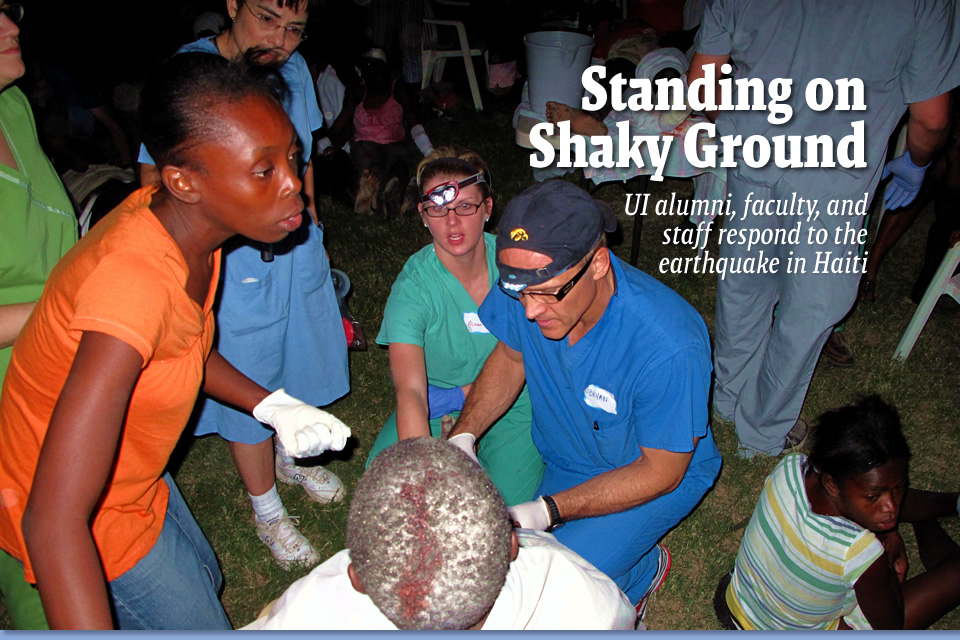-
Page Navigation Links:
- Skip to Site Navigation Links
- Skip to Features

- The University of Iowa
- Spectator
- Monthly News for UI Alumni and Friends
Soon enough there were fractures to set, lacerations to suture, and far too many crushed limbs to amputate. The injuries were nothing new to White, an emergency medicine physician in the Twin Cities, originally from Decorah, Iowa. But these weren’t the usual cases in Leogane, a city of around 120,000 residents about 20 miles west of Port-au-Prince.
White and former classmate Chris Buresh (MD ’01, residency ’06), clinical assistant professor and associate director of the residency program in emergency medicine at University of Iowa Hospitals and Clinics, have regularly led medical mission teams to Leogane as part of their Community Health Initiative with the nonprofit organization World Wide Village. In fact, they’d been in Leogane just days before the quake, tending to patients with diabetes, hypertension, and nutritional needs at a primary care clinic.
As soon as they could assemble medical supplies and arrange for transportation, their team—including pharmacist Brett Faine (PharmD ’07) and resident Dan Wing (MD ’07) of the UI Hospitals and Clinics Emergency Treatment Center—was back in Leogane. At least 80 percent of the city was destroyed, and residents were living along roadsides in tents made of bed sheets and plastic tarps. The hospital that housed the clinic was damaged, so Buresh and White reopened under four tarps tied together with parachute cord. In a week, they saw 1,500 patients.
“People were walking around almost a week after their houses fell on them, with open fractures, huge, gaping scalp wounds, and massive lacerations that hadn’t been closed and were infected,” Buresh says. “But nobody was complaining. The people are so strong.”
While Buresh and White were scrambling to get into Haiti, Bryan Den Hartog (MD ’85) was trying to get out. He had arrived a day before the earthquake with a medical mission team. Several other volunteers in his group were building a permanent clinic and companion facilities in a Port-au-Prince suburb for the nonprofit they represented, Mission to Haiti.
The night of the earthquake, their first-aid station 10 miles from the epicenter treated dozens of patients sprawled out on folding tables.
“What made my heart sink was realizing I didn’t have the equipment necessary to take care of injuries so familiar to me,” says Den Hartog, an orthopaedic surgeon from South Dakota who grew up in Sheldon, Iowa. “There were open fractures that could have easily been treated, but I had no external fixators, no plates, and no screws to do that. I wanted to do so much more for them, but our hands were tied and we couldn’t.”
Lacking proper medical equipment, running low on supplies, and unable to obtain more, Den Hartog’s 50-member group—including his father, two sons, and other relatives—decided to leave two days after the quake. They spent 12 hours at the airport in Port-au-Prince, unable to get a flight. Plans to take a bus to the Dominican Republic airport were thwarted when authorities closed the border. Then, very early on the third day after the earthquake, a U.S. Army colonel found them space on a C-17 bound for New Jersey.
“Things like this can’t help but change your perspective, your worldview on things,” he says. “We lost five kids that night at our little first-aid station. To see the fear on their faces before they passed away, and to see their family members’ grief—these are real people with real needs, and they need our help.”
Den Hartog is determined to return and finish building the Mission to Haiti medical clinic so locals can receive ongoing care. Buresh and White will go back repeatedly to supervise a 50-bed mobile hospital donated to World Wide Village. Staffing the hospital are many UI emergency medicine nurses and doctors, along with fourth-year medical students. Other UI physicians—including anesthesiologists and orthopaedic surgeons—are volunteering through partner relief organizations.
Back in Iowa, UI medical students raised nearly $1,000 with a bake sale and collection that bought a week’s worth of food for 9,000 Haitians. More students helped inventory crutches, walkers, prostheses, and other donated supplies for the mobile hospital.
“There are so many ways the University can be involved in Haiti and participate in the development of a system that can save hundreds of thousands of lives in the next 10 years,” Buresh says.
—Dawn Goodlove
South Dakota orthopedic surgeon Bryan Den Hartog (MD ’85) treats an injured Haitian man on the night of the earthquake.
An interview with UI physician Chris Buresh (MD ’01, residency ’06)
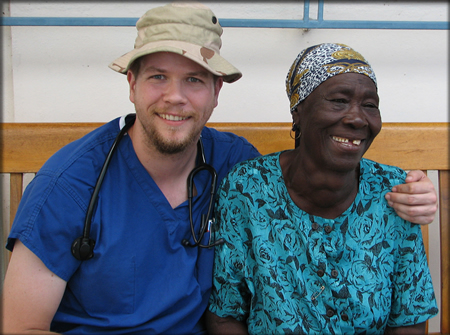
Twin Cities physician Josh White (MD ’01) with a Haitian citizen.
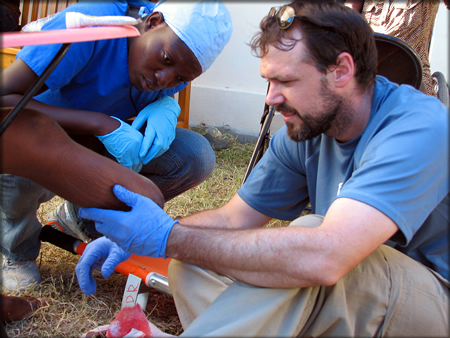
Chris Buresh (MD ’01, residency ’06) examines a Haitian patient’s leg injury. Limb amputations were common because of the severe injuries created by collapsing buildings.
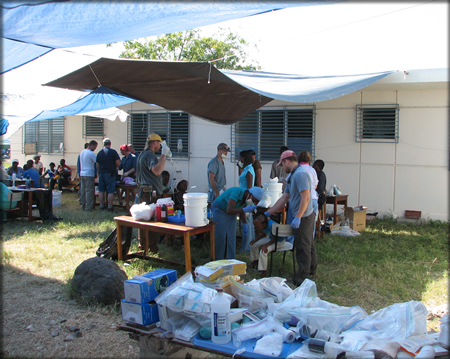
The earthquake damaged so many buildings that the medical team from Iowa set up their clinic outside, underneath tarps.
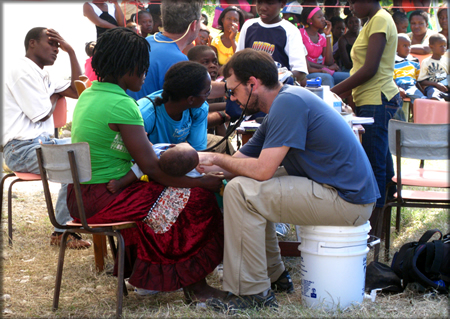
Physician Chris Buresh (MD ’01, residency ’06) examines a young Haitian while others wait at the clinic in Leogane.

(Left to right) Chris Buresh (MD ’01, residency ’06), Brett Faine (PharmD ’07), Dan Wing (MD ’07), and Brett Mayne (BA ’08)—the team members from Iowa. Mayne is a paramedic with the Johnson County Ambulance Service.
© The University of Iowa 2009
